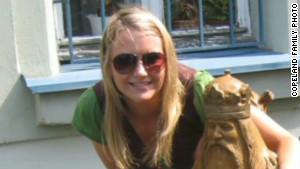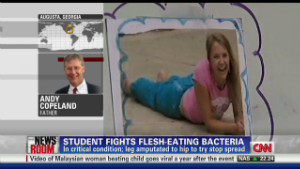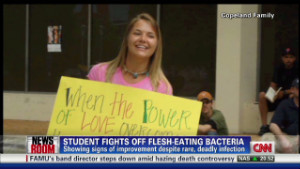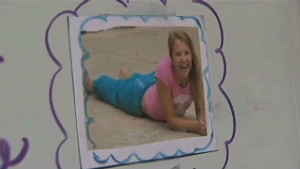
STORY HIGHLIGHTS
- Blood drives are launched in several communities for Aimee Copeland
- She has been on life support since May 4
- "She appears to be remembering ... different conversations," father says
- Copeland's injury occurred May 1 when she fell from a zip line into a river
(CNN) -- The doctors for Aimee Copeland are promising a "roller coaster ride of highs and lows" in the coming weeks and months as she struggles against a rare flesh-eating bacteria, her father said.
"Each day, we claim some small victory," Andy Copeland wrote Tuesday evening in his blog that details his daughter's battle. "We don't have to see physical progress, we seem to take comfort from simple words, silly actions and quiet moments."
Aimee Copeland, who has been on life support since May 4, is in intensive care at Doctors Hospital in Augusta, Georgia.
"Personally I don't like the roller coaster analogy," Andy Copeland said on a website run by the University of West Georgia Psychology Department, where Aimee is a graduate student. "The best part of a roller coaster ride is when you are falling, because although it can be terrifying, it is extremely exhilarating. Sooner or later, the ride has to slow down and crest another incline."
As a result of the damage done by the bacterial infection called necrotizing fasciitis, doctors have removed part of Copeland's abdomen, amputated a leg and expect to remove her fingers, he said.
"However, physicians have hope of bringing life back to the palms of her hands, which could allow her the muscle control to use helpful prosthetics," Copeland said. "They are awaiting a safe time before embarking on surgery for this."




Tuesday was a good day for Aimee.
"She was in high spirits," her father told CNN.
"She appears to be remembering day-to-day different conversations we've had. We actually referred to some conversations she had yesterday, so her memory is -- short-term memory -- appears to be coming back, which is a very encouraging sign."
The master's student in psychology was with friends on May 1 near the Little Tallapoosa River, about 50 miles west of Atlanta, when she grabbed onto a zip line. It snapped and she fell into the water.
The accident left a gash in her left calf that took 22 staples to close.
Three days later, still in pain, she went to an emergency room, where doctors determined she had contracted the flesh-devouring bacteria Aeromonas hydrophila. She was taken to Augusta for surgery.
The infection is fatal in about one in four cases, the Centers for Disease Control and Prevention says on its website.
But, as of Tuesday night, she had not yet fully grasped the extent of her illness, her father said. "As far as all the specifics, we steered her away from the experience itself. To me, it probably does no good in her healing process to bring up any bad memories, at this point."
Bored with television, his daughter was reading and trying to communicate with her family, the father said on the website.
But the ventilator made talking difficult, he said. "Some of the simplest words can take minutes to decipher when you have a tube interfering with your lips and movement of your jaw."
For example, he added, "lamb chop" turned out to be "laptop."
Copeland has been infused with 177 units of blood since she contracted the infection. That's more than 168 pints; the average human body contains about 10 pints of blood, according to America's Blood Centers.
"You've got a lot of need," the father said. "We've got blood drives in Augusta, Carrollton, Winder, Lawrenceville, Snellville," he added, referring to communities in Georgia.
A campus blood drive at West Georgia brought donations from some 200 people, CNN affiliate WSB-TV reported.
"I just felt like I could do something to help, and the least I could do was donate a pint of blood," Shirley Murphy said.
The school will hold another blood drive on June 1.
But for now, the roller coaster ride will continue.
"The inclines tend to be ho-hum, a time to catch your breath and smile at the person sitting next to you," Andy Copeland's blog says. "As you near the top, the anticipation builds until the terrifying exhilaration repeats itself."
No comments:
Post a Comment